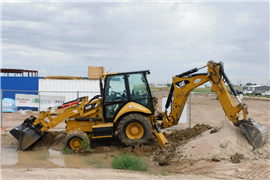UK ‘robust’, despite inflation
04 January 2017
A positive end to 2016 is being reported by UK construction companies, with the fastest rise in new order volumes since last January, although the sector is said to have experienced intense cost pressures as suppliers passed on higher imported raw material prices.
The latest rise in overall input costs was the steepest for just over five-and-a-half years, according to the latest Markit/CIPS Construction PMI (purchasing managers’ index).
The survey, by financial services company IHS Markit and the Chartered Institute of Procurement & Supply, is based on data compiled from monthly replies to questionnaires sent to purchasing executives in over 170 construction companies.
Meanwhile, according to accountants KPMG, 2017 will be a year of feast and famine for the construction industry.
Richard Threlfall, head of infrastructure, building and construction, said, “2017 will divide the construction sector into winners and losers.
“Contractors in infrastructure will win more work as government and utilities companies continue to spend heavily on road, rail and energy investments. Contractors who depend largely on commercial demand will see a decline in demand as corporates continue to delay investment decisions pending clarity on Brexit (the UK’s decision to leave the EU).”
The latest Markit/CIPS Construction PMI survey found that stronger demand patterns resulted in sustained job creation and a broad-based upturn in business activity during December.
At 54.2 in December, up from 52.8 in November, the seasonally adjusted index signalled what was described as a “robust and accelerated expansion of overall construction output”.
The headline index has now posted above the 50.0 no-change mark for four months running, and the latest reading signalled the fastest pace of expansion since March 2016.
Anecdotal evidence was said to have suggested that improving order books and a general rebound in business conditions had helped to lift construction output in December.
Residential building activity remained the best performing sub-category at the end of 2016, and the latest expansion of housing activity was the fastest since January. Work on civil engineering projects also picked up in December, while commercial construction increased only marginally.
New business volumes expanded at the strongest rate for 11 months in December, the survey found, and this marked a sustained recovery from the soft patch seen in mid-2016.
Survey respondents were said to have cited rising client demand and a resilient economic backdrop.
December data indicated that exchange rate depreciation had continued to drive up input prices across the UK construction sector. The latest increase in average cost burdens was found to be the fastest since April 2011.
At the same time, supplier lead-times continued to lengthen, with the latest survey pointing to the most marked deterioration in vendor performance since June 2015.
Low stocks
Some construction firms were said to have noted that forward purchasing had resulted in low stocks among suppliers.
Meanwhile, construction companies reported a reasonably upbeat assessment for their growth prospects in 2017. Around half of the survey panel (48%) expected a rise in business activity during the next 12 months, while only 13% forecast a reduction.
The degree of business confidence edged up to a three-month high during December, with a number of construction firms citing optimism that strong order books would help alleviate turbulence caused by Brexit in 2017.
Tim Moore, senior economist at IHS Markit and author of the Markit/CIPS Construction PMI, said, “December’s survey data confirmed a solid rebound in UK construction output during the final quarter of 2016.
“All three main areas of construction activity have started to recover from last summer’s soft patch, but in each case growth remains much weaker than the cyclical peaks seen in 2014.”
He continued, “The main negative development in December was a sustained acceleration in input cost inflation to its strongest since 2011. UK construction companies noted that the weaker sterling exchange rate had resulted in higher costs for a wide range of imported materials, while some also reported that forward purchasing of inputs had led to depleted stocks among suppliers.”
David Noble, group CEO at CIPS, said, “The residential sector raced ahead this month, with the fastest pace of growth since January 2016. Strong pipelines of new work were reported across all sub-sectors, and construction firms showed improved confidence after the impacts of uncertainty around the EU referendum.
He said that with prices rising at such a strong rate, firms had increased their stock buying not only to fulfil new orders, but also to counteract expected price increases throughout the year, as inflationary pressures were set to continue and the weakness of the pound persisted.
“Stock levels at suppliers were also under pressure, as vendor performance deteriorated to the greatest extent since June 2015,” he said.
“In the short term at least, the sector looks set to enjoy these improved demand conditions for the coming months, which is positive news after many months of instability.”
Regional variation
KPMG’s Threlfall said that apart from the UK seeing a divided construction market, 2017 would also see significant regional variation.
“The West Midlands will benefit from the HS2 (High Speed Rail 2) effect which has already seen an uptick in investment into the region, while worries over Brexit will continue gently to deflate the London housing bubble.”
He went on, “An industry divided by demand will nonetheless be united by the common challenge of rising materials prices, already responding to the fall in the value of sterling.”
He said he remained encouraged that the new government had signalled its commitment to infrastructure by embracing what he called “the three Hs” – Heathrow Airport, HS2 and the Hinkley Point nuclear power station project – “despite strong lobbying in the summer to cancel all of them”.
He continued, “I am, therefore, bullish on UK infrastructure demand in 2017, but far less confident on the longer term. I remain concerned that as the economy weakens the government’s investments in infrastructure will become less sustainable.
“Rising inflation and the subsequent erosion of buying power will mean less government income from taxation.”
He said he expected this to result in delay to schemes like the Crossrail 2 rail line in London, the Trans-Pennine road tunnel, HS3 and other mega projects.
“Amidst all this macro-economic uncertainty,” said Threlfall, “construction industry CEOs need to keep focused on the prize of achieving competitive advantage through offering clients greater efficiency and predictability.
“While politics and economics may dictate the winners and losers of 2017, in the long run this industry will be owned by those who invest in technology and skills.”
STAY CONNECTED



Receive the information you need when you need it through our world-leading magazines, newsletters and daily briefings.
CONNECT WITH THE TEAM











